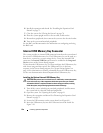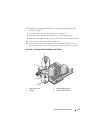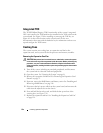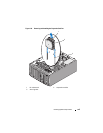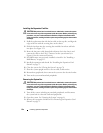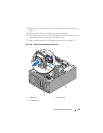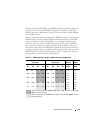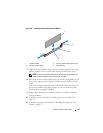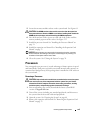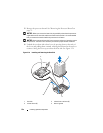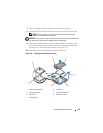
128 Installing System Components
Memory Sparing Support
Memory sparing is supported in single- or dual-processor systems that have one
of the fully populated memory configurations shown in Table 3-1.
The memory
sparing feature must be enabled in the Memory Information screen of the
System Setup program. See "Entering the System Setup Program
" on page 43
.
To use memory sparing, you must disable node interleaving.
Memory sparing is applied independently to the two groups of DIMMs on the
same sides of the processor sockets. To support memory sparing, all DIMM
sockets within a DIMM group must be populated.
When enabled, memory sparing allocates and reserves ranks of memory from
the installed DIMMs to act as spare memory in the event of a memory
channel failure. A memory channel uses paired DIMMs; for memory sparing
to work, DIMMs must be paired as spares also.
Memory sparing allocates only the first rank of memory of a DIMM. For a
single-rank DIMM, the entire capacity of the DIMM must be allocated for
sparing along with the adjacent single-rank DIMM to spare a memory
Table 3-1. Memory Configurations
Total System Memory DIMM Socket
Single-
Processor
System
Dual-Processor
System
DIMM A1/
DIMM B1
DIMM A2/
DIMM B2
DIMM A3/
DIMM B3
DIMM A4/
DIMM B4
1 GB 2 GB 512 MB 512 MB
2 GB 4 GB 512 MB 512 MB 512 MB 512 MB
2 GB 4 GB 1 GB 1 GB
4 GB 8 GB 1 GB 1 GB 1 GB 1 GB
4 GB 8 GB 2 GB 2 GB
6 GB 12 GB 2 GB 2 GB 1 GB 1 GB
8 GB 16 GB 2 GB 2 GB 2 GB 2 GB
8 GB 16 GB 4 GB 4 GB
12 GB 24 GB 4 GB 4 GB 2 GB 2 GB
16 GB 32 GB 4 GB 4 GB 4 GB 4 GB



